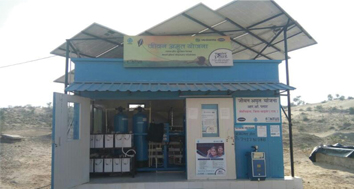Cairn India under a Memorandum of Understanding (MoU) with Public Health and Engineering Department (PHED) of Rajasthan is establishing 331 RO plants across Barmer District. These plants have varying capacities from 1,000 to 3,000 litres per hour capacity and will be installed over the next three years to provide safe drinking water to a large number of people (estimated in excess of 1 million) living in 800 villages. One of India’s leading water treatment solution provider, Fontus Water is the implementing partner for the project.
Use of Renewable Energy: Since power availability remains unreliable in some areas in Barmer to address this issue, Cairn is providing solar powered RO plants in their new project. Barmer has abundant sunlight availability throughout the year. To maximize use of this renewable source of energy, CAIRN India has given mandate for operating some water purification plants with solar energy. Cairn India has planned to setup around 35 solar operated plants under this initiative.
First Solar Based RO Plant: The first plant based on this pioneering initiative and India’s largest solar operated community based RO Plant, has been installed at Sewniwala in Baytu Tehsil. The plant has MNRE certified panels and generating a power of 5KW and storing the same in batteries, which can be used for 8-10 hrs of plant operations. The water from this plant will be sold at 25 paise per liter to the local community.
Serving Ram Devra Pilgrims: The solar Sewniwala plant also serves devotees travelling to Ram Devra, a local pilgrimage spot in the Jaisalmer area. Devotees from Barmer walk more than a couple of hundred kilometers every year to the town of Ram Devra. Given the high temperatures (summer temperatures in the area can go upto 50°C) and sparse vegetation, the pilgrims find a major need for water, which this plant has helped address.
This installation has put Sewniwala on world map and will help in improving various health issues of the local people by providing purified drinking water at their door step. This is an innovative example of sustainable solutions in community development, where environmentally-friendly green solutions are being used to serve the poorest population with safe drinking water.
Other Advantages of Solar:
Environment friendly: Solar energy is an alternative for fossil fuels as it is non-polluting, it does not pollute the air by releasing harmful gases, so the risk of damage to the environment is reduced.
Low maintenance cost: Initial cost of solar panels is steep but there are practically zero recurring costs.
Easy Installation: Solar panels are easy to install and does not require any extra space, wires, cords or power sources.
Long Lasting Solar Cells: Solar cells make no noise at all and there are no moving parts in solar cells which make them long lasting and require very little maintenance.
Save power: As an alternate source of power it saves electricity
Greatly Reduced Contribution to Global Warming: There is no carbon dioxide, methane or other emissions that warm the atmosphere.
Improves Fire-Reduction: Electricity, Generators have a safety threat, whereas solar electric light is entirely safe.





